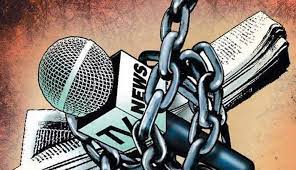- 25 March 2024
If Media’s Freedom is compromised, it will shrink Democratic Space

By Alusine Fullah
The significant impact of the media on the development of the nation is crucial. The media should be the driving force for development as it creates awareness among citizens and makes the government accountable. Hence, to achieve the Sustainable Development Goals (SDGs) in Sierra Leone and the country’s medium-term plan, the media in its monitoring and reporting mechanism, can raise the voice of the voiceless and critically monitor the government. In line with that, several scholars have vividly noted that media freedom should not be compromised. Those scholars and other experts know the significance nature of the media national development. But if that significance is shrunk, chances are there will be LITTLE democratic space for citizens to express their concerns.
Sierra Leone has in the past four years made progress in the entire gamut of press freedom and freedom of expression ecosystem; thanks largely to the historic repeal of Part V of the Public Order Act, 1965, which contained the offences of Criminal and Seditious Libel.
The concept of freedom of expression started since Adams’ Days. Media Freedom was born from the womb of Freedom of Expression. Article 19 of Universal Declaration of Human Rights (UDHR) has ensured the right to freedom of speech and opinion.
The Criminal Libel Law was repealed in Sierra Leone in 2020. Its repeal sparked a sense of good move in the enjoyment of media freedom in Sierra Leone. As a way of replacing the repealed law, in 2020, the Independent Media Commission Act was amended. That notwithstanding, certain sections in the said amendment go against the principles of transparency and accountability. Indeed, if media’s freedom is compromised, it will shrink democratic space, and government agencies will be less accountable and transparent.
To avert such crisis, political parties and civil society must play a vital role. Curtailing media rights will mean curtailing individual rights and freedom of expression.
When the New Direction Government was reselected in 2023, there were high hopes that the country would now embark on the journey of peace and stability. Meanwhile, there were also scepticisms that democratic space could shrink under the new step-up — a strong government with a nearly two-thirds majority and a weak opposition.
A series of decisions taken by the government seem illegal. In fact some tactics use by the government to muzzle the media, clearly indicate that the media and freedom of expression are in peril. Time has come to exert pressure on the government to roll back such decisions which seriously hinder freedom of speech and free media.
Looking at several reports from MRCG, the writings are on the hall that there still remain troubling chapters in the story – physical attacks, threats, judicial harassment, summons, arrests and detentions, and intimidating interrogation of journalists by government institutions still happening in Sierra Leone.
Despite several efforts have been made by the authorities in the attainment of media freedom, journalists are still find it extremely arduous to freely express on national issues. The idea of attacking journalists is still taking centre stage. This can be proven by the reports published by the Media Reform Coordinating Group ( MRCG).
In line with that, in February 2024, MRCG monitored the invitation and detention of two journalists in Freetown. It also followed up on various issues, including the attack on the office and staff of a radio in Makeni, Northern Sierra Leone, the online ‘death threat’ against a journalist, assault on a journalist, alleged destruction of property of a journalist in Freetown while on duty, alleged assault on a journalist in Moyamba district, alleged verbal threat against a journalist by a police officer, alleged physical assault of two journalists, alleged ‘assassination attempt’ on a journalist in Kambia district, the matter of former Anti-Corruption Commission (ACC) boss, Ady Macauley Esq., the alleged physical assault on a journalist in Waterloo, the matter between a journalist and a magistrate in Pujehun and other media engagements.
The report reads: On the online ‘death threat’ against Musa S. Kamara, a journalist working for radio Democracy 98.1 FM, the matter is still under police investigation. Musa still maintained that he was yet to hear from the police regarding their investigations. Police said they were still investigating the matter. On the matter of the BBC Correspondent in Sierra Leone, Umaru Fofana, who was attacked by supporters of the All Peoples Congress (APC) party during the party’s press conference at the New Brookfields Hotel in Freetown on 14 June 2023, Mr. Fofana again told MRCG that he had not received any update from the APC Party on its said investigation since June 2023, The Secretary General of the APC, Lansana Dumbuya Esq., maintained that the matter was still under investigation.
To conch it all, I think at this 21st century, there should be a paradigm shift from the idea of attacking journalists to engaging journalists. Media plays a crucial role in shaping a healthy democracy and ensuring good governs. As an important source of information media has been functioning the role of the heart of democratic society and Good governance. According to Norris, the media has three key roles in contributing to democratization and good governance. The very vital function of media is to act as a watchdog over the powerful, promoting accountability, transparency and public scrutiny. Indeed, the media should function as a civic forum for political debate, facilitating informed electoral choices and actions; and the third function is to act as an agenda-setter for policy makers, policy makers, strengthening government responsiveness for instance to social problems and to exclusion.
